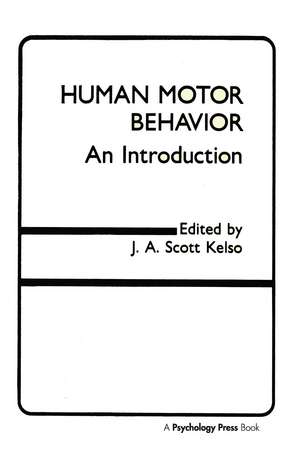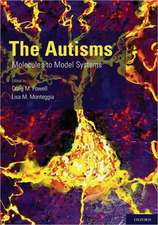Human Motor Behavior: An Introduction
Autor J.A. Scott Kelsoen Limba Engleză Hardback – aug 1982
Preț: 285.50 lei
Nou
Puncte Express: 428
Preț estimativ în valută:
54.63€ • 58.42$ • 45.55£
54.63€ • 58.42$ • 45.55£
Carte tipărită la comandă
Livrare economică 17 aprilie-01 mai
Preluare comenzi: 021 569.72.76
Specificații
ISBN-13: 9780898591880
ISBN-10: 0898591880
Pagini: 320
Dimensiuni: 152 x 229 x 19 mm
Greutate: 0.48 kg
Ediția:1
Editura: Taylor & Francis
Colecția Psychology Press
Locul publicării:Oxford, United Kingdom
ISBN-10: 0898591880
Pagini: 320
Dimensiuni: 152 x 229 x 19 mm
Greutate: 0.48 kg
Ediția:1
Editura: Taylor & Francis
Colecția Psychology Press
Locul publicării:Oxford, United Kingdom
Public țintă
ProfessionalRecenzii
"...the book's strengths include a strong emphasis on theory and many examples of the necessity for creative methodology to solve problems related to understanding movement coordination."
—Physical & Occupational Therapy in Pediatrics
—Physical & Occupational Therapy in Pediatrics
Cuprins
Preface, PART I: PERSPECTIVES AND ISSUES IN MOTOR BEHAVIOR I. The Process Approach to Understanding Human Motor Behavior: An Introduction 2. Concepts and Issues in Human Motor Behavior: Coming to Grips with the Jargon PART II: INFORMATION PROCESSING, MOTOR LEARNING, AND MEMORY 3. Information-processing Framework for Understanding Human Motor Behavior 4. Motor Control and Motor Learning: The Closed-loop Perspective 5. Memory for Movement with Emphasis on Short-term Aspects PART III: FROM COMPONENT ANALYSIS TO MOTOR PROGRAMS 6. Component Analysis and Conceptions of Skill 7. Learning and Control of Coordinated Motor Patterns: The Programming Perspective PART IV: GENERALIZED MOTOR PROGRAMS AND SCHEMAS FOR MOVEMENT 8. More on Motor Programs 9. The Schema Concept PART V: DEGREES OF FREEDOM, COORDINATIVE STRUCTURES, AND TUNING 10. The Bernstein Perspective: I. The Problems of Degrees of Freedom and Context-Conditioned Variability I The Bernstein Perspective: II. The Concept of Muscle Linkage or Coordinative Structure 12. The Bernstein Perspective: III. Tuning of Coordinative Structures with Special Reference to Perception. Epilogue: Two Strategies for Investigating Action
Notă biografică
J.A. Scott Kelso, J.A. Scott Kelso












